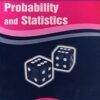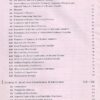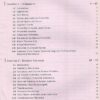Description
In recent years, the growth of statistics has made itself of vital significance in almost every phase of human activity. Statistics no longer involves merely collection of data and their presentation in charts and tables, it is now regarded as to encompass the science of basic inferences on observed data and whole problem of incorporating decisions in the face of uncertainty. This covers sufficient ground since uncertainties are met when we flip a coin, when a dietician experiments with food additives, when an actuary determines life insurance premiums, when a quality control engineer accepts or rejects manufactured products, when a teacher compares the abilities of students, when an economist forecasts trends, when a newspaper predicts an election results, and so forth. It would be presuming to say that statistics, in its present situation of development., can deal all conditions involving uncertainties, but new techniques are constantly being developed and modern statistics can, at least, provide the framework for looking at these states in a logical and systematic fashion. In other words, statistics provides the models that are required to study conditions having uncertainties, in the same way as calculus provides the models that are needed to illustrate, say the concepts of Newtonian physics.
















 Hanuman Chalisa - Pocket Edition In Hindi (Hardbound)
Hanuman Chalisa - Pocket Edition In Hindi (Hardbound)
Reviews
There are no reviews yet.